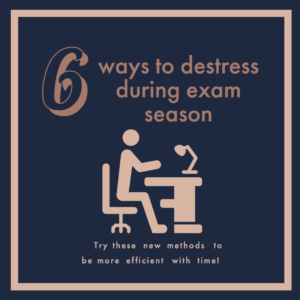Managing test anxiety
Students across the nation take standardized tests like the SAT, ACT, and PSAT to qualify for scholarships and get into their dream universities. However, because of the weight put on the resulting scores, test anxiety is a common occurrence. “Go out there and do your best and then come up with an actionable plan,” counselor Sean Burke said.
September 9, 2022
You walk in, find your last name, and sit down. It’s the most important test of your entire life. Its results will impact the trajectory of the rest of your career. Or so you’ve been told.
You studied for years, all for a three hour exam. Yet when you flip open the packet and the timer begins, your mind is blank. All you notice is the time slipping through your fingers like sand and the fact that you have no idea what is going on. The clock is ticking, you can’t breathe, your heart is pounding in your head, and your mind is blank.
You have test anxiety. But you are not alone.
An estimated 40 to 60% of students across the nation are affected by test anxiety, and can experience both physical and psychological symptoms. Some can be life-threatening and stress inducing, including heart palpitations, lack of self-confidence, shaking, sweating, and difficulty concentrating or breathing.
“There are a million reasons to develop test anxiety,” counselor Sean Burke said. “I think one of them is attending a school that puts such an emphasis on achievement. [Students] have a previous history of outstanding achievement, and that’s part of their identity. It takes a while to get used to [Jefferson], so how we do things can trigger some of that.”
Other triggers include placing too much emphasis on a single test, equating grades with self worth, and the fear of disappointing loved ones or parents. Social media is also a common cause.
“Everything is so public—where you go to school, what you’re doing, how you’re doing it,” Burke said. “Everyone puts their best foot forward and everyone else feels like they’re being left behind. It escalates.”
With most sophomores taking the PSAT for the first time and juniors attempting to get certain test scores for their college applications, learning how to manage test anxiety is crucial.
“Acknowledge that it’s an issue,” Burke said. “You need to talk it out logically and come to a better understanding of what the value of the testing is. Coming to [Jefferson] is not to earn a certain GPA. It’s to expand your understanding of the world we live in, and to find a subject matter that interests you and can pursue that in college.”
Understanding that success in high school and college doesn’t equate to having a successful career is also critical. Hundreds of Jefferson alumni are successful in their industry of choice without having gone to a top university.
“We need to do a better job of [connecting] students in high school to alumni who have been in their shoes and struggled, but are now fine,” Burke said. “Some of the anxiety comes from ‘What does this mean? If I have a 3.8, can I be successful? Can I run a company someday? Could I be a doctor?’ Absolutely you can. You can be better than a 4.7 at your vocation.”
Lastly, Burke encourages students to remember that testing is becoming less important to the college admissions process. Grades, course rigor, and extracurricular activities are all more heavily weighed than a standardized test score.
“Ten years ago, the SAT had a more prominent role in admissions,” Burke said. “It’s much less now, so it’s not going to make or break your college admissions. You can have a perfect score. Wonderful, but that’s no guarantee for anything. [If] you get a 1440, you can still go to the best schools in the world.”
At the end of the day, there is more to life than a test score or a grade. If you find yourself experiencing anxiety during the middle of a test, there are many tips available from top universities and organizations on how to refocus your mind.
“The unknown is really terrifying,” Burke said. “Sometimes I think as a community, we don’t do a good enough job of letting students know that the path forward will take care of them. Just keep learning. Keep pushing yourself, keep working, [and] you’ll be fine.”









![A group of juniors play “Clash Royale” on their phones during lunch. Lunch is the only time when phones are allowed to be out. “I think once we adapt to it, it's not going to be something we miss because [for] everyone moving forward, that'll have been the policy [since] middle school,” DNA science and biology teacher Aubrie Holman said.](https://www.tjtoday.org/wp-content/uploads/2025/09/IMG_6621-2-e1758016994220-300x239.jpeg)